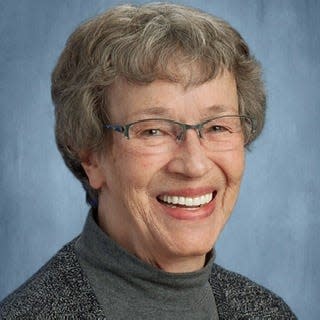Sharon Kourous: April is National Poetry Month
We live in a time when words are used and misused in great numbers. The trash vortex of emails, tweets, and ads arriving in one’s inbox multiplies exponentially. Bloviating politicians assault our space constantly. Words hit our eyes and our ears from the moment we reach for our phone while still abed in the morning until we fall asleep glassy-eyed, clutching that same phone at night. But meaning evades us in this language glut. It is literally hard to hear ourselves think.
Modern life’s deficit of empathy, of an ability to feel seen and to see others is obvious in the renewed interest in mindfulness meditation. So many of us are seeking that moment when we can be alone and yet feel the presence of a shared humanity. Like meditation, poetry requires us to put away our phones, shut out the sargasso sea of noise, to find oneself in words: their meaning and their music. Poetry uses language the way music uses sound, rhythm, repetition. For the musician and her audience, music meets an elemental need. Poetry crystalizes meaning in words shaped and wrought into moments of power — or of inner silence. Poetry Month reminds us of this power, it reminds us poetry can be a doorway to understanding ourselves and others through empathy.

Rhythm and verse are among the most primeval of human expressions, found in earliest times and all societies. There is a reason why infants love clapping games, why children love nursery rhymes, why toddlers dance whenever music surrounds them. Perhaps it arises from the world of sound a baby hears in the womb: the beating of its mother’s heart, the gurgle of her gut or pumping of her blood, the voices and music nearby. Perhaps this carries over into the nearly universal custom of bedtime stories bonding parent and child. Neuroscience tells us our brains as well as our bodies are attuned to rhythm, repetition, and language — to poetry.
Like music, poetry employs sound, meaning, repetition, and nuance; it gives us words to express our innermost selves. In very primitive and visceral ways, the sounds and meanings of words show each of us we are not alone in the world; that the confusions and fears keeping one awake are indeed, universal and shared and human. We each need words that help us understand ourselves as unique individuals even when sharing a universal emotion or experience. Poets voice the hopes and fears of those who are sad, or happy, or oppressed; who are migrants or refugees, or judged by their society. As well as words that give comfort, we also need voices speaking difficult truths; often those voices are found in poetry.
Because poets have taught themselves how to shut out the noise of the world even as they employ a clear-eyed gaze while watching it, because they often discard the inessential and speak right to the heart of our lives, we can find in poetry the words that clarify our fears, express our losses, tell us about the horror our fellow men have wrought as well as the wonders and joys of our lives. Today poetry speaks with numerous diverse voices: some as spoken poetry, and spontaneous poetry slams in small gatherings of friends, or in bars or pubs. Other poets help us see oppressed people through the poetry of migrants, minorities, slaves, war-torn towns. Others help us understand our own complicated lives, and possibly share them with those important to us. We need poetry at weddings and funerals, at graduations, and in the joyful moments of parties or family gatherings, or to give the gift of the words one needs to express love.
Poetry Month offers you an opportunity to walk away from the word-garbage heap of daily life. The website of the Academy of American poets, poets.org, will provide a daily poem in your inbox, access to modern poets speaking to current issues, and a voice that just might speak to you, might encourage you to shut down the screen. You might even take up the challenge offered there, and carry a “poem in your pocket” on April 18. Consider this your mindfulness homework.
— Sharon Kourous is a member of Stronger Together Huddle, a group engaged in supporting and promoting the common good of all. She is the author of two forthcoming books of poetry and lives in Monroe.
This article originally appeared on The Holland Sentinel: Sharon Kourous: April is National Poetry Month